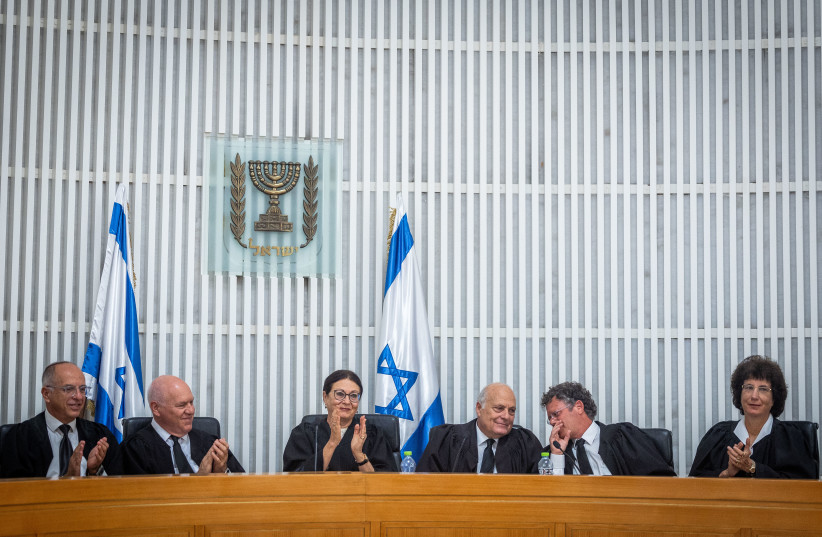Meet former deputy chief justice Salim Joubran: The embodiment of coexistence
Contrary to most reports, Salim Joubran, who died on March 15, was not the first Israeli-Arab Supreme Court justice when he was appointed in 2003.
Technically, that distinction goes to Abdel Rahman Zuabi, who received a temporary appointment as a Supreme Court justice in 1999.
However, Zuabi served for only nine months.
Joubran served from 2003 to 2017 and finished with the rank of deputy chief justice, as well as being the first Israeli-Arab to chair the Central Elections Commission.
In that sense, he was the father of the idea that a minimum of one seat should be an Israeli-Arab.

Since then, his seat was filled by two other Israeli-Arabs. First George Karra, for a short term; and now by Khaled Kabub.
In that regard, Joubran convinced the Jews of Israel that the court’s identity must somewhat reflect the country’s multi-religious nature, and convinced the Arabs of Israel that partnering with Israeli society can be worth it and have real results.
Not everything was perfect. There was an incident in 2012 when Joubran came under attack by many in the political sphere when he stood for the singing of “Hatikvah” during a state ceremony, but he clearly did not sing the words.
Ultimately, Joubran weathered the storm, with many mainstream political and judicial officials pointing out that as long as he stood and conveyed respect, that neither he, nor Israeli-Arab soldiers, could be expected to sing about Jewish longing to return to their homeland.
Orthodox former deputy chief justice Elyakim Rubinstein was one of those who publicly came to Joubran’s defense at the time, and he eulogized Joubran last week as one of his close friends in the court.
Most of the time, though, Joubran managed to stay out of and above politics.
He represented Israel around the world and served as one of its brightest lights in embodying Israeli multicultural coexistence.
Whenever critics tried to tear Israel down as discriminating against Arabs, the example of Joubran could be rolled out as a stark contrast to that narrative.
Joubran was involved in a myriad of historic decisions.
He was on the panel of three justices who rejected the appeal of former president Moshe Katsav, sending him to prison for seven years for rape and sexual abuse.
Likewise, he was on the bench of five justices who rejected part of the appeal of former prime minister Ehud Olmert, sending him to jail for two plus years on various charges of public corruption.
Ever the independent thinker, Joubran was the one dissenting vote on the Olmert panel when four justices tossed out the largest conviction for Olmert having allegedly requested that a middle man give NIS 500,000 to the former prime minister’s brother, Yossi Olmert. Had they listened to Joubran, Olmert would have spent many more years in prison.
Regarding equality issues, he was a consistent and unabashedly liberal voice whether for Jews or for Arabs. He wrote soaring opinions about justice and fairness that even his conservative critics sometimes respected more than they respected quieter closet activists, who often ruled liberally but tried to frame themselves in technical non-activist terms.
In his final case – a 2017 ruling on same-sex couples’ surrogacy rights – Joubran said that he found it difficult to come to terms with a situation in which single people and same-sex couples were blocked from fulfilling their dreams to become parents through surrogacy agreements.
He said he could not see the justice of giving preference to heterosexual parents over same-sex parents, though the court as a whole deferred the issue for six months to give the Knesset time to resolve legislation on the issue which it was already considering.
In addition, Joubran advocated religious freedom and pluralism for Jews, often banging heads with the haredi rabbinic establishment.
Regarding Israeli-Arab equality, he dissented in a major 2014 razor-thin 5-4 Supreme Court decision which kept a law in place that allowed “acceptance committees” to vet and reject candidates using vague criteria for around 434 yishuvim (villages) in the Negev and the Galilee.
That law replaced an earlier law previously struck down by the Supreme Court which explicitly permitted discrimination against Israeli-Arabs in those villages.
However, Joubran and three other dissenting justices said that the new law would be used to achieve the same outcome and impact as the old law of discriminating against Israeli-Arabs, and possibly sometimes against haredim or other minority groups. This was even if, at face value, the new law did not explicitly discriminate.
The new brand of moderate-formalist activists allied with a growing group of conservatives to keep the law, but unapologetic liberals like Joubran could not stand a law which would likely cause inequality, even if there were technical reasons to avoid or delay striking the law until it played out more in the real world.
In 2016, in the High Court’s 4-1 decision, Joubran got to vote in the majority against justice Noam Sohlberg, invalidating a 10-year price freeze and cap on legal liability rule that was part of Prime Minister Benjamin Netanyahu’s natural gas policy.
Joubran also voted 3-2 in the majority against Sohlberg and then-justice Esther Hayut to suspend the policy for a year while the government would adjust the price and liability issues.
But in that same series of rulings, the Supreme Court affirmed virtually all of the many other aspects of the policy by a 4-1 majority, with only Joubran dissenting.
This included empowering Netanyahu to override and circumvent objections of the antitrust authority on the grounds of national security.
This was huge.
The prime minister, acting as his own economy minister, could override the antitrust authority on a question of economics using national security as a reason.
Joubran had no problem switching back to being in the minority on that issue to check what he regarded as executive power overreach.
Critics would say that Joubran harmed the country’s economic development and imposed his own world view in place of the representative of the voters, Netanyahu.
But Joubran viewed the court as the last line of defense of those in society who were weaker; and if that meant protecting the antitrust authority in a way that slowed down economic development, he was at peace with that. Unlike other liberal justices, he was willing to say it out loud.

I met Joubran a number of times at conferences and Supreme Court ceremonies, and I saw him in action countless times on the bench.
There were some on the bench who struck me as having been promoted up through the ranks but basically remaining the same as they had always been, simply at a higher rung within the judiciary.
Joubran seemed to hold himself differently and think in terms of his place and the court’s place in history, and trying to find the right side of history to be on without getting dragged down into the technicalities of the moment.
Once again, conservatives would not like many of his rulings but would honor his honesty and the sense that he was a true believer and not just playing the politics of his sector of society.
I also found him to be kind and a gentleman, with a lightness in an old-fashioned way that is hard to capture in the social media punchy age of 2024.
A graduate of the Hebrew University of Jerusalem, Joubran practiced private law from 1970 until 1982 before leaving to accept an appointment to the Haifa Magistrate’s Court. In 1993, he was appointed to the Haifa District Court, and was then promoted to the Supreme Court in 2003.
At his retirement, he preached stronger commitment to coexistence and to integration of Israel’s Arab minority.
In an age of unbridled partisanship and personal ambition, Joubran’s voice of being respectful, honest, and genuinely committed to the State of Israel, though his background could have given him every excuse to take an opposite path, will be missed.





Comments are closed.